Start 2024 by asking: ‘Why do science?’
Step back from the usual lab-meeting format, and ask yourself and your colleagues why you all do what you do, say Mirko Treccani and Laura Veschetti.
Last year, one of us (M.T.) joined Erasmus University Rotterdam in the Netherlands as a visiting PhD student. While there, he had the chance to participate in epidemiologist Jeremy Labrecque’s Friday journal club. This meeting revolved around a variety of topics surrounding science, and was aimed at boosting participants’ scientific creativity and discussion skills. During one session, Labrecque asked the attendees, who were at different stages of their careers, “Why do you do science?” Soon after the meeting, M.T. told L.V. about this exchange. We were both excited by this question, and — as usual — we ended up discussing our thoughts and opinions on the matter. We started thinking about asking this question to members of the GM Lab at the University of Verona in Italy, where we do our research.
Once M.T. was back in Verona, we proposed having a similar discussion at one of our lab meetings. These are usually focused on project updates and methodological discussions, but our mentor, computational geneticist Giovanni Malerba, welcomed our idea with open arms.
We asked Malerba and our ten fellow lab members (trainees, PhD students, postdocs and lab technicians) the question last June, but told them not to reply immediately. We instead asked them to save their answers for a special lab meeting, held a few days later. After a few moments of initial uncertainty, we were delighted to see everyone writing many words and sentences on a whiteboard.
The most senior members of the lab reported that they had become scientists to satisfy an existential need: the curiosity and thirst for knowledge that is intrinsic to every human led them to science, to try to answer the big questions of life. But some early-career researchers added that they view science as a way to unravel complex puzzles and answer questions, and to build a better future. Colleagues from low-income countries, as well as some undergraduate students, expressed feeling a strong call to answer more immediate social needs and improve people’s lives today. Others said that they simply found science fun.
The meeting helped us to openly discuss the role of scientists and to explore aspects of our personalities that often remain hidden during everyday work. We felt more connected as a group and felt validated in our pursuits in this field because of our similar underlying reasons.
Sometimes, we scientists get too caught up in deadlines and in our daily responsibilities, and we forget to step back to regain some focus on the big picture. Both of us will treasure this lab meeting: we feel the discussion enabled us to grow not only scientifically, but also personally. The discussion did not end on that day, but kept coming up during coffee breaks throughout the year. Given the great success of the first meeting, we hope to make this discussion a yearly event, to involve new team members and reflect on our growing experience as scientists.

